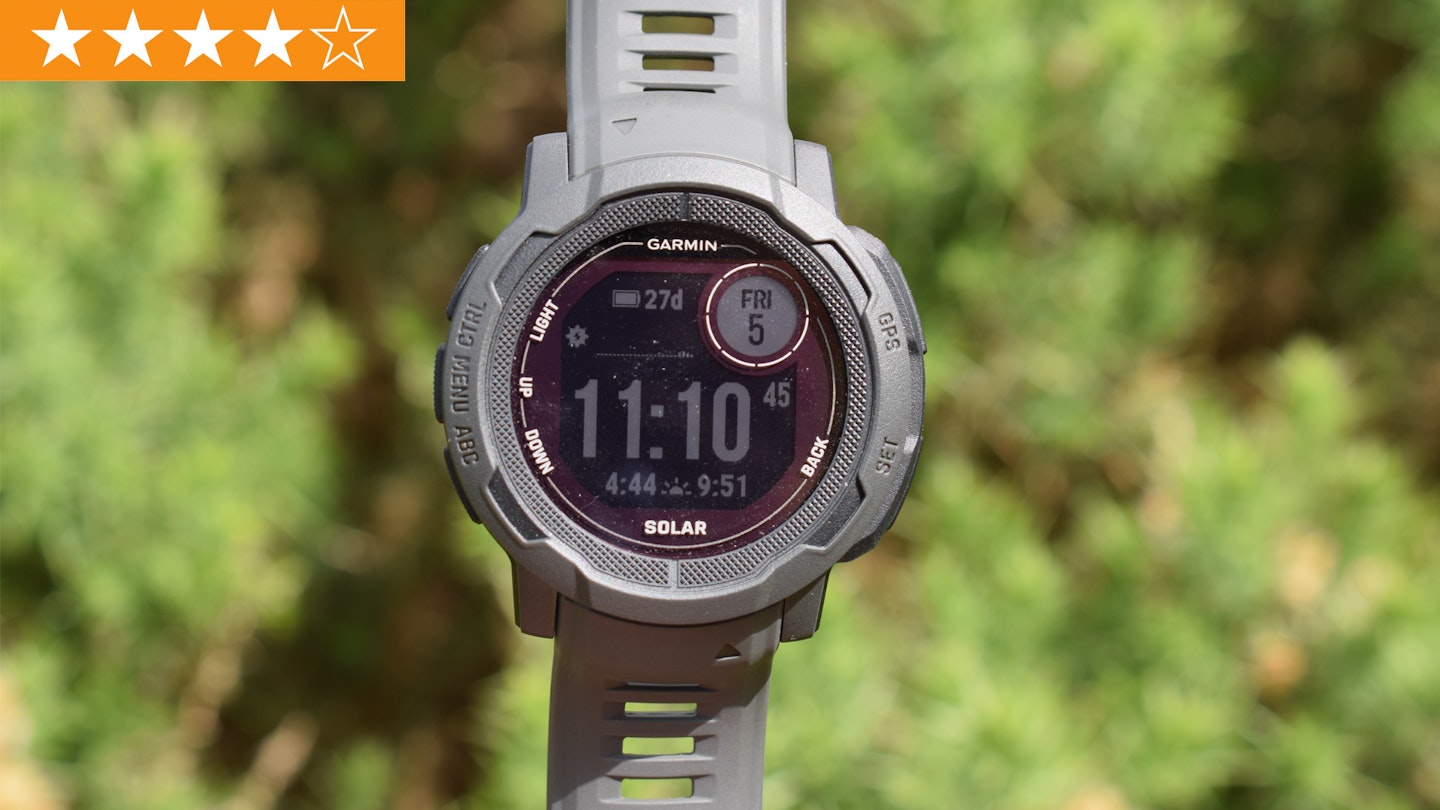In our eyes, the Garmin Instinct 2 Solar is a great all-rounder of a GPS running watch – a rugged, super-tough, versatile outdoor smartwatch that will appeal to multi-sports adventurers, the kind of people who are hiking and climbing one day, then running and kayaking the next.
It doesn’t feel particularly running-centric or running-focused, so hardcore runners should perhaps look elsewhere for the specialism they require, but for all-round outdoor use it hits the spot.
 LFTO
LFTOPros
- Affordable
- Super-rugged
- Durable
- Lightweight
- Versatile
Cons
- Poor screen
- No dual band frequency
- No onboard music
- No topographical maps
- Monochrome only
| Battery life (smartwatch mode) | Up to 28 days |
| Battery life (GPS) | Up to 30 hours |
| Display type and size | Corning Gorilla Glass, 176 x 176 resolution, 0.9” |
| Weight | 54g |
| Waterproof rating | 10ATM |
The Instinct 2 Solar has some big pros and big cons. The positives? It’s well-priced at under £300, pitched at the premium end of the entry-level market, and offers good value for money.
The design is very rugged and protective, yet lightweight (only 54g) and compact. It fits comfortably and holds nicely on the wrist, and performance is solid in terms of GPS accuracy and battery life. There’s nothing fancy or flash here, but the uncomplicated, no-nonsense approach will appeal to some.
The negatives? The screen is very small (only 0.9”), basic and monochrome, and somewhat underwhelming overall. It’s certainly far from the best at displaying information, metrics and maps.
You don’t get dual-frequency (multi-band) GPS or access to the QZSS or Beidou satellite networks, and the 30 hours of battery life is good but not exceptional.
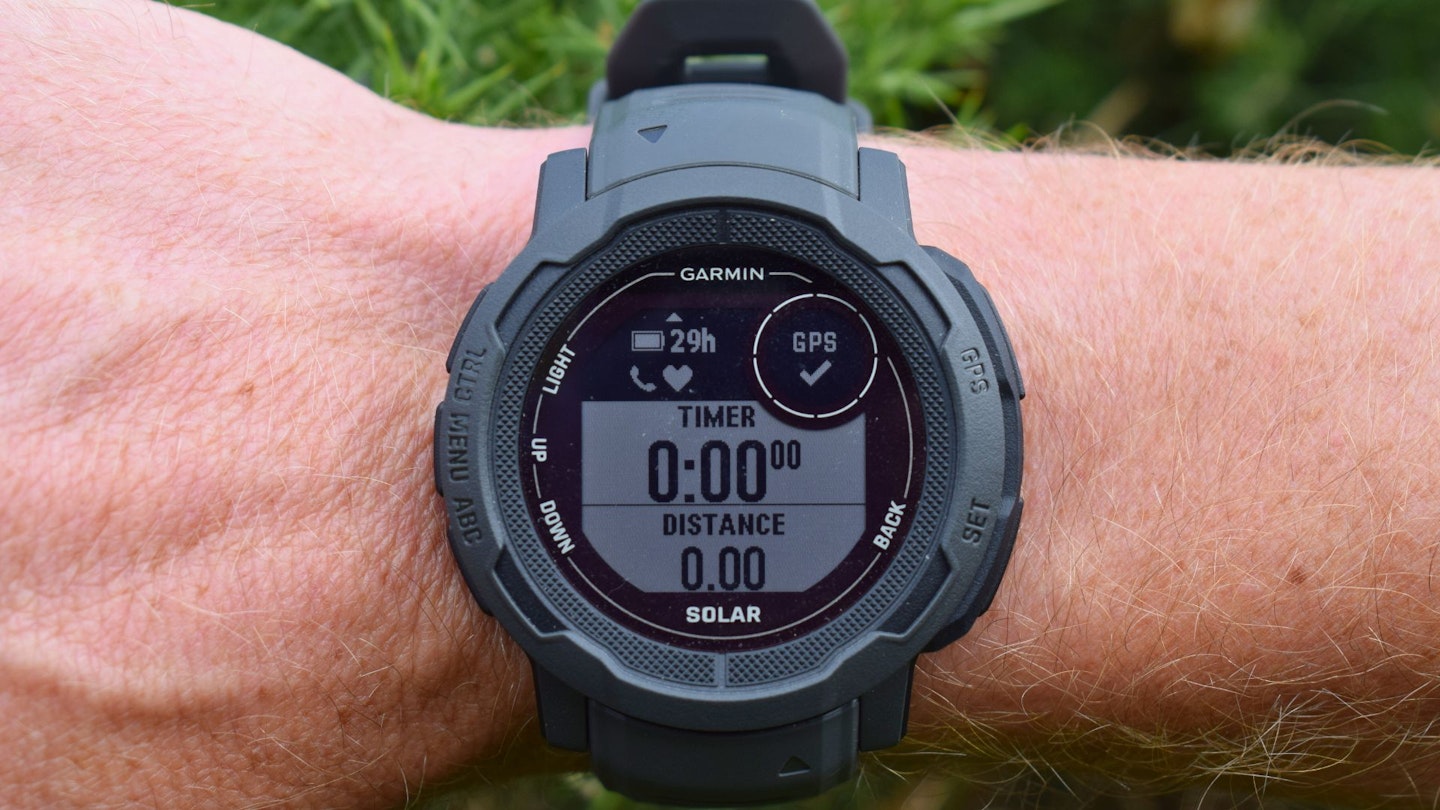
The solar charging system is arguably a bit gimmicky for the UK too, particularly considering our lack of sunshine, and how much of a battery boost it will really deliver is difficult to gage. If you’re not convinced, the Garmin Instinct 2 (non solar version) costs only £219.99 and is, perhaps, a better option.
Having said all of this, the Garmin Instinct 2 has a lot going for it. It’s a neat’n’nifty watch with a bombproof, adventure-ready design. The price-tag is affordable, it’s lightweight and – for most users – the battery life, GPS accuracy and all-round performance will prove more than adequate.
Or, in other words, the Instinct 2 Solar is a watch that does the job with an understated confidence and simplicity, without the unnecessary faff of some other high-tech, mega-complicated alternatives.
Shop this product
Design, screen and user interface

In a marketplace where smartwatches are getting more and more futuristic and high-tech, attempting to collect a million and one metrics, and be everything from music player and social media interface to sports coach and navigation assistant, the Garmin Instinct 2 Solar is the antidote. This watch keeps things simple and uncomplicated, both externally and internally, and delivers a fuss-free design that prioritises functionality and practicality over sexy high-tech wizardry.
The design appears almost tactical, with a military-inspired look and feel. It’s certainly incredibly rugged and tough, with a bombproof fibre-reinforced polymer case and a chemically-strengthened, scratch-resistant Corning Gorilla Glass display. It feels so rugged you almost feel like you could chuck it off the top of Ben Nevis’s North Face and it’d barely get a scratch.

Shop this product
All this ruggedness comes in a small package, however – like a short, squat, but super-burly SAS muscle man. The watch is compact and neat, with five buttons, two on the right-hand side of the bezel and three on the left.
The screen is 0.9” wide, which is very small – the smallest of all the GPS running watches we’ve tested recently. It’s a monochrome MIP (memory-in-pixel) screen, with a 176x176 pixel resolution and a dual-screen design (there’s an extra circular window in the top-right corner of the display).
This screen approach will polarise opinion. If you’re a glass-half-full kind of an adventurer, these are the positives: the basic screen is very battery efficient and won’t drain away too much of the watch’s juice; you still get decent visibility in all lighting conditions and reasonable contrast, despite the lack of colour; and, for some, the simplistic approach means you’ll only see the important stats and not get bombarded by extraneous, unnecessary extras.
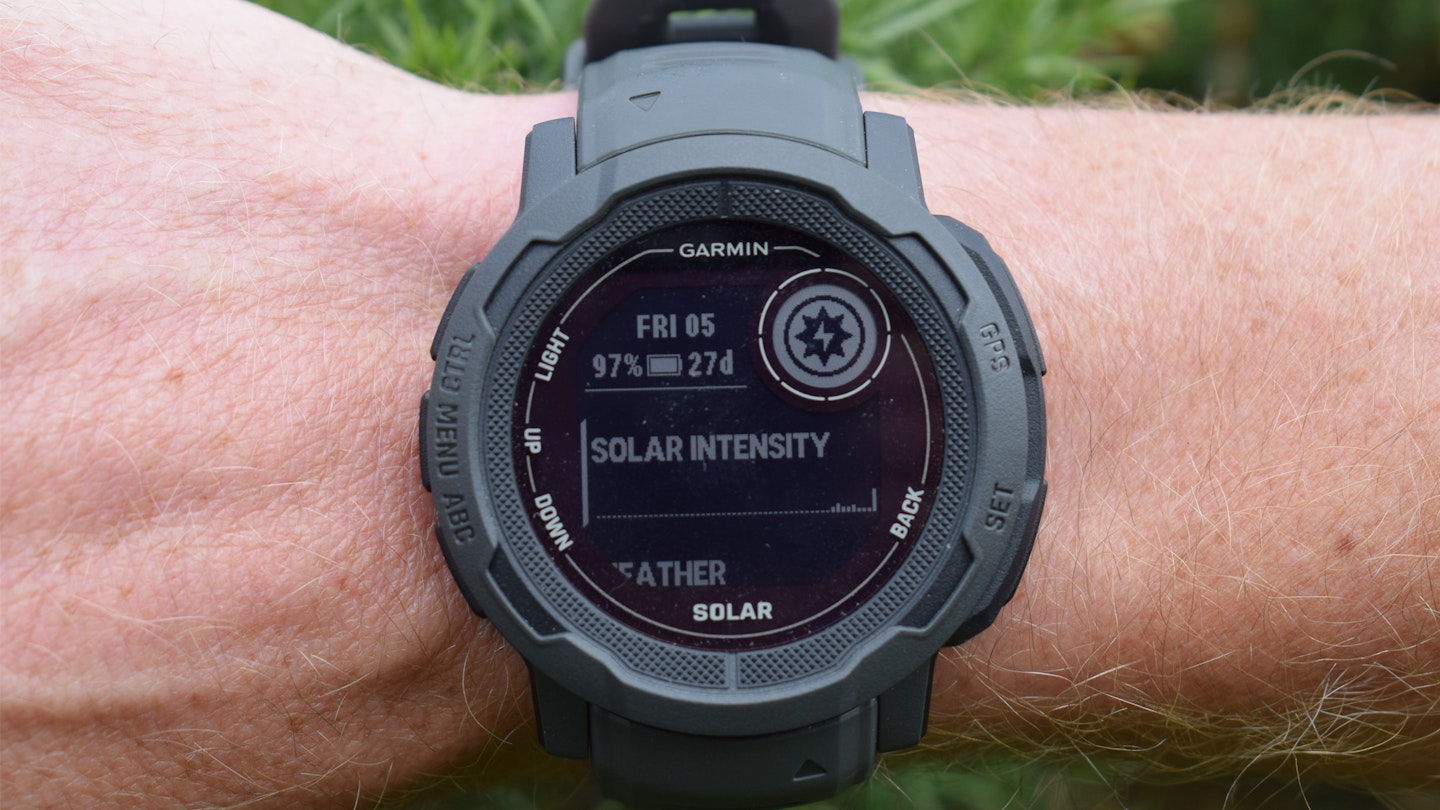
Shop this product
However, for £300, you’re probably entitled to be disappointed by this screen. Many runners will find it too basic, dull and out-dated, with a display that’s far too small. This is particularly noticeable when trying to view maps and routes, which may involve excessive squinting and exasperation. The display also lacks brightness and contrast, and – ultimately – we expected more.
The user interface of the Instinct 2 Solar is pretty easy to navigate. The presence of 5 hardware buttons makes toggling between different screens, modes and settings pretty easy, and the all-round layout is decent. But it all feels a little basic and out-dated. Some runners may love the simplistic approach; others may find themselves desiring a higher-tech, refreshed interface.
GPS accuracy

Shop this product
Living in the market town of Cockermouth, on the edge of the Lake District, we’re blessed with an epic adventure playground on our doorstep. Consequently we put the Garmin Instinct 2 Solar through its paces on several training trail runs in our local north-western fells, including lakeshore paths, mountain climbs, ridge routes and urban-rural mixed paths.
During all of the tests, we never had any problems with GPS accuracy. The watch tracked our runs accurately and precisely, it locked to GPS signal quickly before each activity, and we never noticed the GPS trace jolting off on a tangent (like malfunctioning GPS tracks sometimes do).
You don’t get access to the QZSS or Beidou satellite systems with Garmin, and the brand told us that its use of GPS, GLONASS and Galileo was “the industry standard” with “global coverage”. In truth, we couldn’t notice any drop-off of in activity recording accuracy with the lack of QZSS or Beidou.
You also don’t get dual-frequency (multi-band) GPS with the Instinct 2 Solar – this is reserved for Garmin’s pricier models such as the Fenix 7 Pro.
Again, we didn’t really notice any impact from this omission, but on runs in big cities surrounded by high-rise tower blocks, or in dense woodland for mile after mile, the lack of dual-frequency may noticeably reduce the accuracy of the Instinct 2 Solar’s tracking.
Weight and size
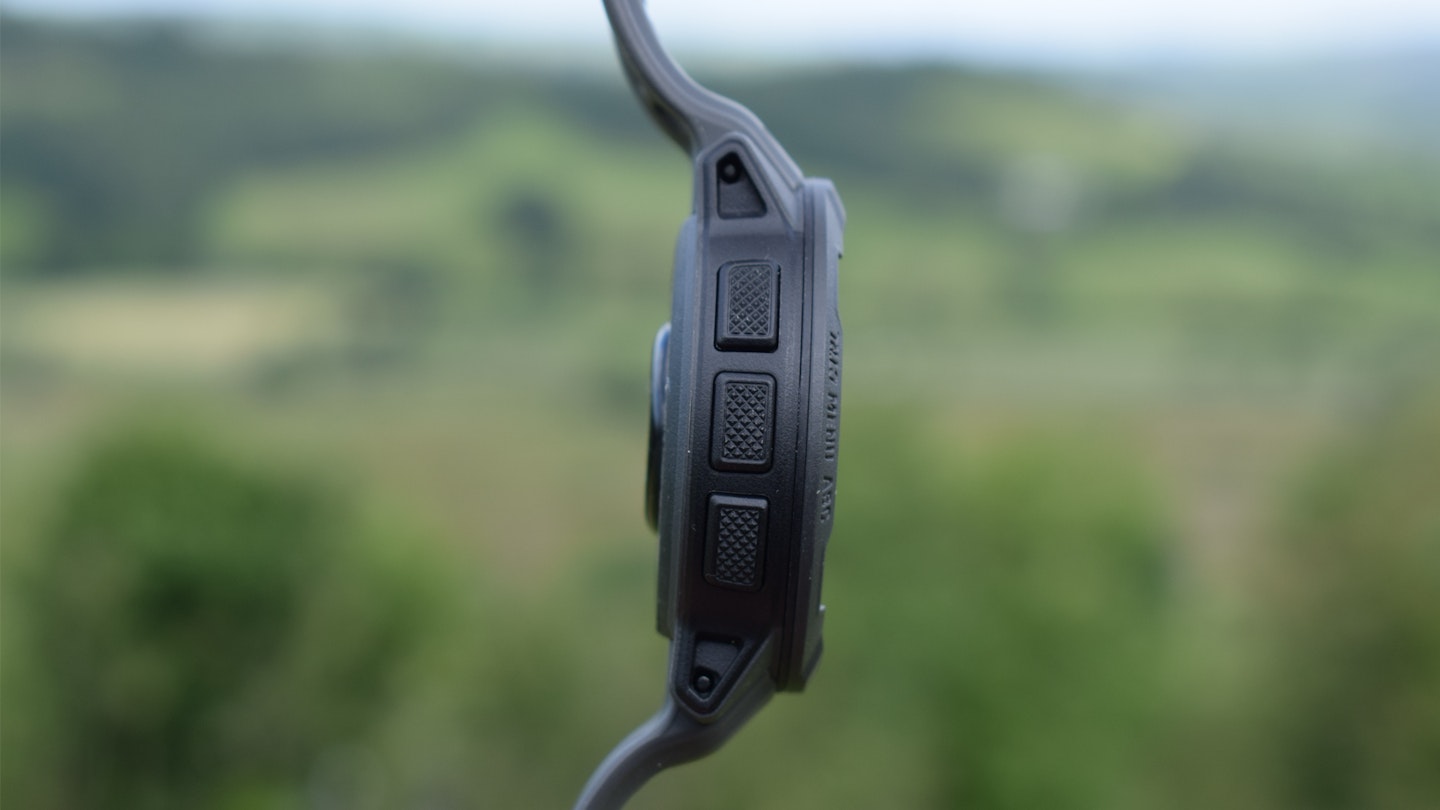
Shop this product
On our scales the Garmin Instinct 2 Solar (45mm version) clocks in at just 54g. That’s very light – 21g lighter than the Garmin Fenix 7 Pro, 34g lighter than the Coros Vertix 2S and 29g lighter than the Suunto Race. Big weight savings all-round. The only lighter watch we’ve tested in recent years is the Coros Pace 3 (39g).
Despite being very rugged, the Instinct 2 Solar comes in a compact package. The bezel size is 45x45x14.5mm, which is pretty streamlined and not too thick. Consequently the Instinct 2 Solar fits the wrist comfortably (Garmin says it’s suitable for wrist circumferences of 135-230mm) and remains slip-free during running, even at top speed.
Battery life
The Instinct 2 Solar has pretty solid battery life, particularly considering the price point. Garmin state the following official stats: 28 days in smartwatch mode (65 days in battery saver mode, unlimited with solar); 30 hours in full GPS mode (48 hours with solar); and 70 hours in max battery GPS mode (370 hours with solar).
Max battery mode means phone connectivity, wrist heart rate, pulse oximeter, backlight and mapping functionality are all turned off, the screen is in “time out” mode, and UltraTrac gps tracking is activated. The latter decreases the update rate of GPS data and temporarily turns off GPS to save battery.
This massively boosts battery life but simultaneously decreases the accuracy of tracking, and is generally recommended more for slower-paced hikes than faster trail runs or ultras.
Shop this product
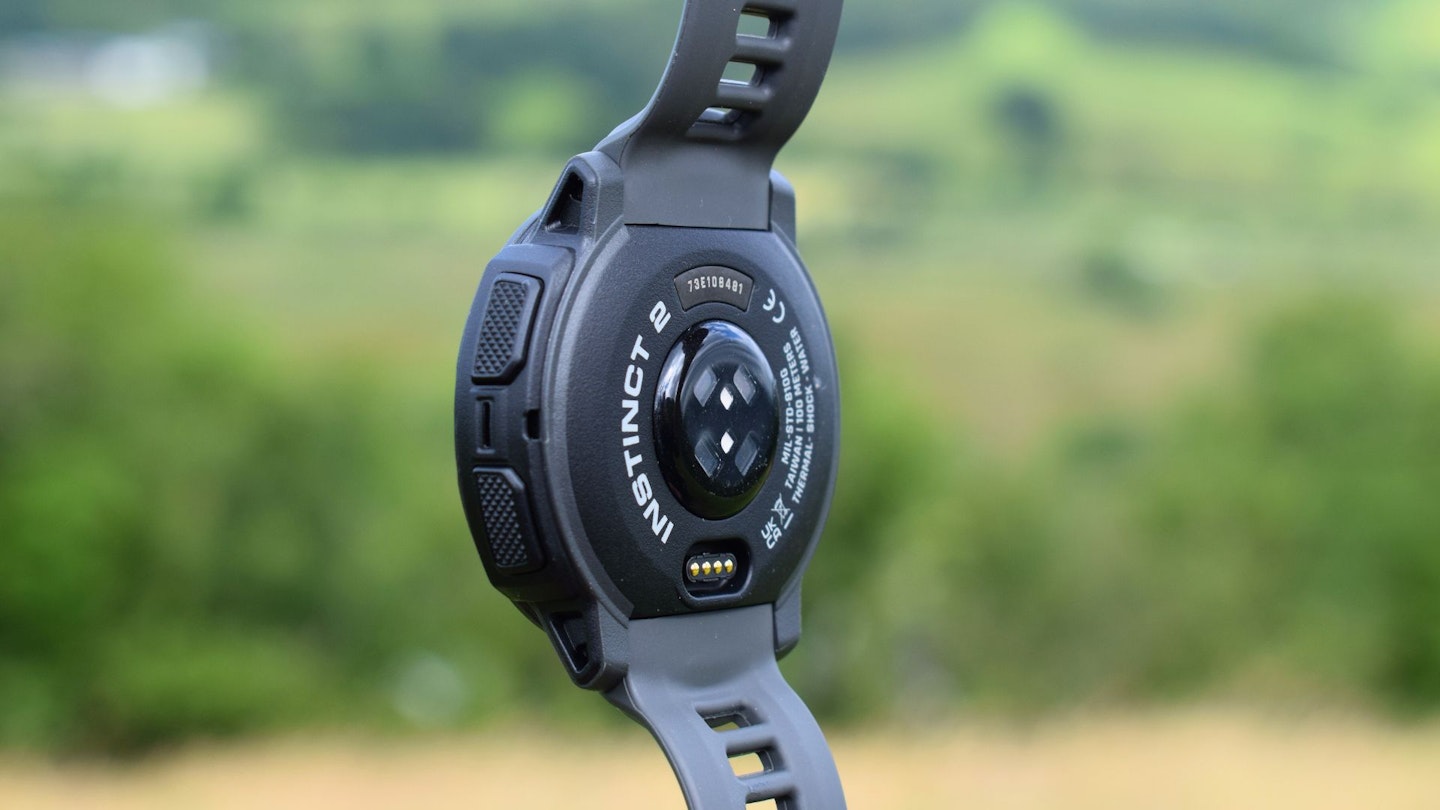
It’s also worth noting that the battery boosts quoted above for solar charging assume the following: all-day wear with 3 hours per day outside in 50,000 lux conditions. This is optimistic for the UK’s mountains. Of course you might get lucky, but don’t rely on always getting this uplift.
All in all, 30 hours of battery life in full GPS mode is pretty good. It’s powerful enough for most ultra-length runs and big adventures, and offers comparable performance to similarly-priced models.
The Coros Pace 3 offers 25 hours on full GPS use (without dual-frequency), for example. But more expensive watches may offer slightly longer-lasting batteries than the Instinct 2 Solar. The Suunto Race delivers 50 hours in performance mode, for example.
Water-resistance
The Garmin Instinct 2 Solar has a 10ATM rating, which means it can withstand pressures equivalent to a depth of 100 metres under water. This means you don’t have to worry about taking it off in the shower or bath, and if swimming is part of your exercise regime, you’re good to go.
Shop this product
Navigation and mapping

As we’ve mentioned elsewhere before, we’re not big fans of using a GPS smartwatch for navigation – it always seems an over-fiddly process, and the screen is always too small. If you run with a phone, using an app such as OS Maps works far, far better.
However, if you’re a trail runner who doesn’t carry a phone with you, the Garmin Instinct 2 Solar does have mapping functionality. You can create a course in the Garmin Connect app, sync it to your watch and the follow the route on the screen while you’re running.
This works just about ok, but it’s far from great. The screen is too small for this, the non-topographical maps are so basic they’re almost pointless, and the whole exercise seems a little futile to us. You might think differently, however.
Other navigation features include trackback routing, reference points and a myriad of other clever settings and options. You also get Garmin’s ABC sensors, including an altimeter for elevation data, barometer to monitor weather and 3-axis electronic compass for taking a bearing.
Shop this product
Running: Training, coaching, heart Rate and app
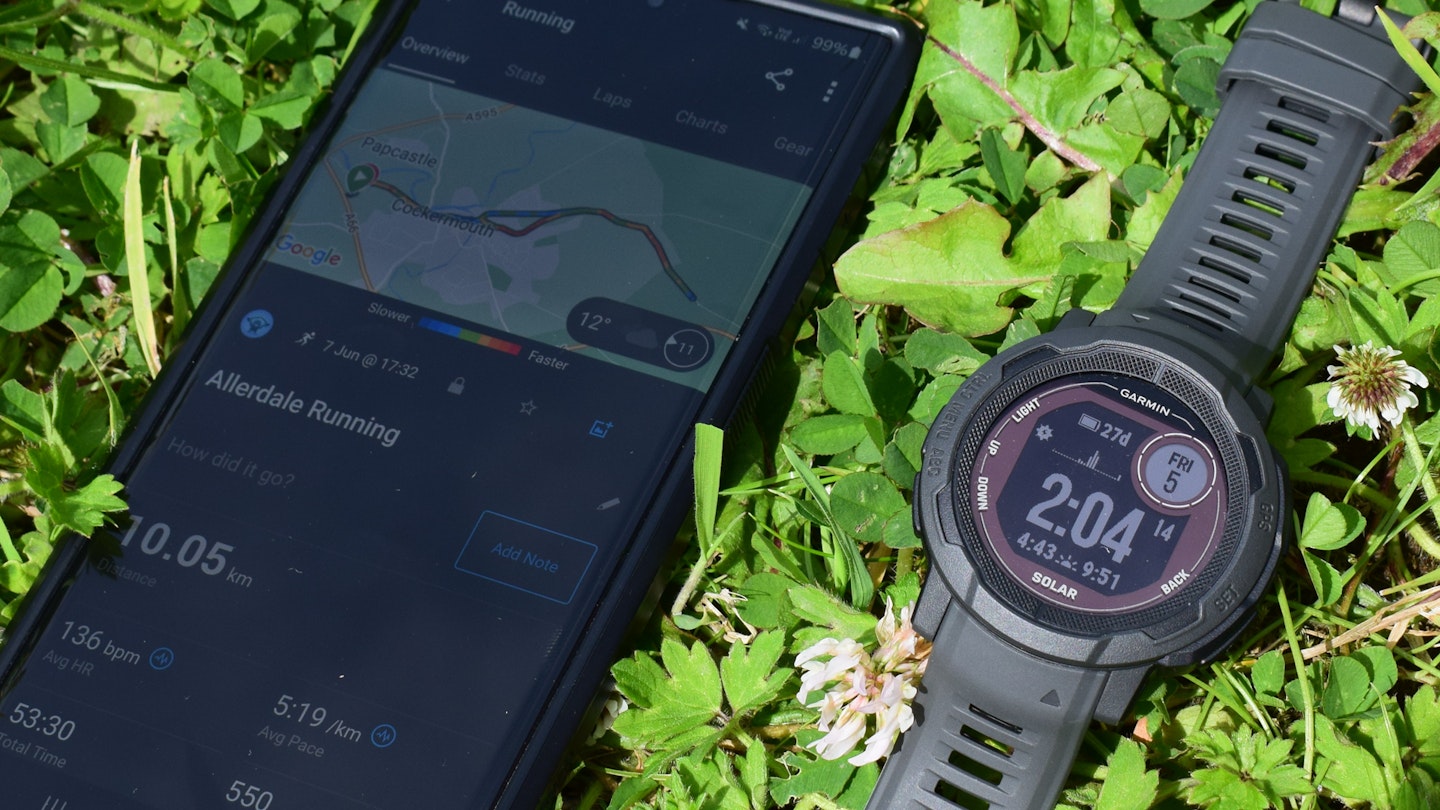
Our favourite feature here is Garmin’s PacePro, which enables you to set yourself a bespoke pace target for a set distance (i.e. a half-marathon or marathon road race), or even to fine-tune the pace targets based on a set routes elevation profile.
This is how it works. Using the Garmin Connect app, you can create a custom pace band based on distance and pace, or distance and time. You can also create a pace band for a known course to optimise your pace effort based on elevation changes. For runners chasing a PB, or a set performance on a specific trail running course, this is a superb service.
Everything else you’d expect in terms of technical, performance-based running is available with the Garmin Instinct 2. Data, insights and metrics are all saved and displayed in the Garmin Connect app on your phone or desktop computer, and the app itself works well and has a good reputation with a 4.2* out of 5 rating on the Android Play store across 935,000 reviews and over 10 million downloads.
If you’re a stat geek or like to follow exercise plans, the Instinct 2 Solar offer built-in sports apps. HIIT workouts, VO2 max readings, daily workout suggestions, recovery times, wrist-based running power and heart rate measurements, and so much more.
Shop this product
Other features
The user manual for the Garmin Instinct 2 Solar runs to a whopping 126 pages, with dense text instructions throughout. So suffice to say we can’t cover all of the features here. But a few we’d reference as our favourites include Garmin Pay integration (a nice feature to be included in an entry-level watch), calendar view and smartphone notifications.
Verdict
A tough-as-nails, versatile multi-sports watch with a refreshingly uncomplicated design and approach – but several features are lacking.
Shop this product
How we tested

James Forrest tested and reviewed the Garmin Instinct 2 Solar over several runs and walks in his native stomping ground of the Lake District. James reviews every type of outdoor kit for Trail and is a real authority on everything you need for wild camping and packing light for a multi-day walk.
